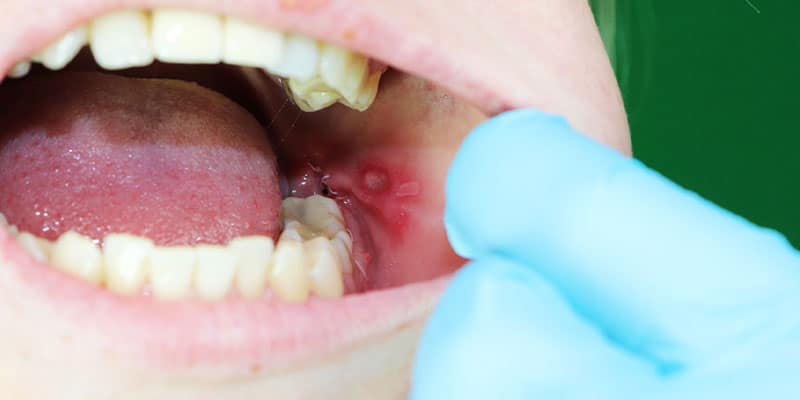- What is a canker sore?
- Canker sore vs. cold sore
- Home remedies for canker sores
- How to treat canker sores that are more than three weeks old
- Can you prevent cankers?
Have you ever felt pain and irritation on the inside of your cheek, and poked your tongue there to rub against a mushy growth? If so, you probably have a canker sore (aphthous ulcer).
Canker sores are quite common and overall harmless, but they can be quite irritating, especially if you keep probing it with your tongue or biting down on it. Their presence doesn’t indicate that you haven’t been keeping your mouth clean, nor do they suggest poor oral maintenance habits. In fact, the medical community still debates their actual cause.
In the meantime, you’re still probing away and wondering how to treat canker sores. First, let’s establish what they actually are before determining what you can do about them.
What is a canker sore?
A canker is a small, non-contagious mouth ulcer that can develop on the soft parts of the mouth, including the inside of your cheeks, your tongue, just inside your lips, or on your soft palate (the back portion of the roof of your mouth). Many people associate ulcers with internal medicine, such as having one in your stomach or duodenum. However, they can actually appear anywhere in or on your body.
The good news is that they don’t hang around very long, but they can cause you a level of discomfort as they erupt and develop.
They’re also somewhat unsightly, often white or grey in colour with red edges, and can appear alone or as part of a cluster. It’s good that they grow inside our mouths where no one can see them!
Medical professionals often classify cankers by three types:
- Minor canker sores: These small, oval-shaped mouth ulcers are the most common type of canker. They usually heal without scarring in under two weeks.
- Major canker sores: These large, deep cankers are generally round with a clearly defined border, and can be quite painful. Very large sores can have irregular edges. They can take up to six weeks to heal, and can leave heavy scarring.
- Herpetiform canker sores: These cankers are relatively uncommon, and usually appear in older adults. Despite its name, this type is not caused by a herpes virus infection. They’re generally pinpoint-sized, often develop in clusters of 10 – 100 that can merge into one large mouth ulcer, and heal in under two weeks without scarring.
These mouth ulcers are fairly easy to diagnose due to their visibility and the tingling, burning sensation you feel as they erupt. However, some patients have also experienced fever, fatigue, and swollen lymph nodes in relation to their canker sore.
Why have I got ulcers after a tooth extraction?
Although the medical community hasn’t determined what exactly leads to mouth ulcers, they’ve been seen to develop after a patient goes through oral surgery, usually disappearing in 7 – 10 days.
However, they can appear even if you haven’t visited the dentist. Some of the other factors that could result in mouth ulcers include:
- Accidentally biting your cheek
- Abrasions from your braces
- Brushing too hard
- An injury to your mouth
- Sensitivity to certain foods, including anything spicy acidic, dairy, eggs, certain nuts or berries, and caffeinated food and beverages
- An allergic reaction to certain oral bacteria
- Low vitamin B-12, zinc, folic acid, or iron
- Hormonal shifts during menstruation
- Emotional stress
Being afflicted by certain medical conditions, including celiac disease, Crohn’s disease, ulcerative colitis, Behcet’s disease, and some autoimmune disorders can also cause mouth ulcers.
Canker sore vs. cold sore
Canker sores and cold sores aren’t the same. Cold sores, also known as fever blisters or herpes simplex type 1, typically appear outside of your mouth, such as under your nose, around your lips, or under your chin. When they appear in your mouth they are usually found on your hard palate or right beside your teeth. In contrast, cankers only grow inside your mouth and are located on soft tissues like your cheek, lips and soft palate.
From a medical standpoint, cold sores are known to be caused by a virus, and erupt as painful blisters filled with fluid. Also, unlike cankers, cold sores are contagious.
Home remedies for canker sores
Home remedies for canker sores There are many home remedies for canker sores you can try to ease the pain and speed up the healing process. However, the science behind the causes and cures for cankers isn’t definitive, and no home remedy has been known to provide instant relief, so be sure to proceed with caution.
- Mouth rinses: Try gargling with salt water or a mixture of baking soda and a cup of warm water
- Milk of magnesia: Dab a little on a cotton swab and apply it to the canker sore
- Apply topical products: Try treating the canker sore with medicated creams, gels, pastes, and liquids
You can also relieve your discomfort by not chewing near the area, avoiding acidic or sugary drinks, and not chewing gum. This will help prevent irritating the sore further.
In short, time will be the best healer of your mouth ulcer, but if the canker sticks around longer than a few weeks, it’s time to visit your dentist.
How to treat canker sores that are more than three weeks old
Pain from cankers tends to subside in a few days, and the sore itself should heal within two weeks. However, if your mouth ulcer is still there after three weeks, or if the sore is large or extremely painful at any time, your doctor or dentist can help alleviate the pain and accelerate healing by prescribing and/or recommending:
- Mouthwash containing a steroid or painkiller
- Oral medications
- Using a dental laser or chemical application to cauterize the mouth ulcer
You should also seek out medical attention if the sores impede swallowing, you start to feel unwell as they develop, or they recur regularly over a long period of time.
Can you prevent canker sores?
Medical research hasn’t been able to determine how to prevent canker sores, but some health professionals recommend a few ways you can minimize your chances of developing them, such as:
- Not eating citric, spicy, or acidic foods that irritate your mouth
- Avoid chewing gum
- Use a soft-bristled toothbrush after meals, and floss daily to keep your mouth as clean as possible
If you have any questions about canker sores, be sure to reach out to our team. We’re here to help!
Wondering how to treat canker sores? Yonge Eglinton Dental in Toronto can help!
Canker sores are rarely dangerous, but they can be painful and annoying! If you need help with a canker or want to book a routine dental checkup, give Yonge Eglinton Dental a call today at 416-932-2222 or book an appointment online. We’re always ready to help you achieve optimal oral health.
Concerned about visiting the dentist? Read about how we protect the health and safety of our patients and staff so your family can seek proper dental care with peace of mind.








